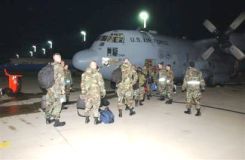US commander, Rwanda govt discuss peacekeeping plans in Darfur
By EDWARD RWEMA
KIGALI, Rwanda, May 31, 2005 (AP) — The top U.S. military commander in Europe discussed with senior Rwandan officials Tuesday plans to airlift peacekeepers from the small central African nation to Sudan’s western Darfur region, scene of one of the world’s worst humanitarian crises.

|
|
Members of the U.S. Air Force board a C-130 aircraft at Ramstein Air Base, Germany, early Friday, Oct. 22, 2004. Three Ramstein C-130 aircraft and approximately 90 airmen departed Ramstein Friday morning for Kigali, Rwanda, to begin an airlift mission to the Darfur region of Sudan. The airmen and two of the C-130s from the 38th Airlift Squadron will transport Rwandan peacekeepers to the Darfur region over a two-week period. (AP). |
Marine Gen. James. L. Jones, the NATO supreme commander and the head of the U.S. European Command, also discussed U.S. plans to train Rwandan peacekeepers, fly them to other areas where they may be needed and strengthen military cooperation between the two countries.
Jones was in Rwanda for a one-day visit during which he met Rwanda’s President Paul Kagame and defense officials. The visit came 10 months after senior defense officials signed a military cooperation agreement.
“Am happy to note that Rwanda’s military has a wonderful reputation, so we in the U.S. feel very strong in going in support to Rwanda’s peacekeeping efforts to help bring the situation in Darfur to a more manageable situation,” Jones said in Rwanda’s capital of Kigali.
The U.S. airforce flew nearly 200 Rwandan peacekeepers to Darfur late last year. They were among the first foreign troops who were sent in an effort to stabilize the troubled region.
At least 180,000 people have died _ many from hunger and disease _ and about 2 million others have fled their homes in Darfur to escape the conflict between rebels on one side and government forces pro-government militia on the other.
The crisis in Darfur erupted when rebels took up arms against what they saw as years of state neglect and discrimination against Sudanese of African origin. The government is accused of responding with a counterinsurgency campaign in which the ethnic Arab militia known as Janjaweed committed wide-scale abuses against ethnic Africans.
